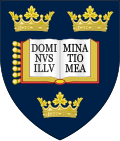 | |
| Parent institution | University of Oxford |
|---|---|
| Established | November 2005 |
| Director | Adrian Hill |
| Staff | 100 |
| Key people | Sarah Gilbert [1] Helen McShane |
| Formerly called | Edward Jenner Institute for Vaccine Research |
| Address | Old Road Campus Research Building (ORCRB), Roosevelt Drive, Oxford OX3 7DQ, UK |
| Location | , , |
| Coordinates | 51°45′07″N1°12′59″W / 51.7519293°N 1.2163045°W |
 Interactive map of The Jenner Institute | |
| Website | www |
The Jenner Institute is a research institute on the Old Road Campus in Headington, east Oxford, England. It was formed in November 2005 through a partnership between the University of Oxford and the UK Institute for Animal Health. [2] It is associated with the Nuffield Department of Medicine, in the Medical Sciences Division of Oxford University. The institute receives charitable support from the Jenner Vaccine Foundation. [3] [4]
Contents
The institute is led by Prof. Adrian Hill. [5] The institute develops vaccines and carries out clinical trials for diseases including malaria, tuberculosis (vaccine MVA85A), ebola, and MERS-Coronavirus. [6] [7]


